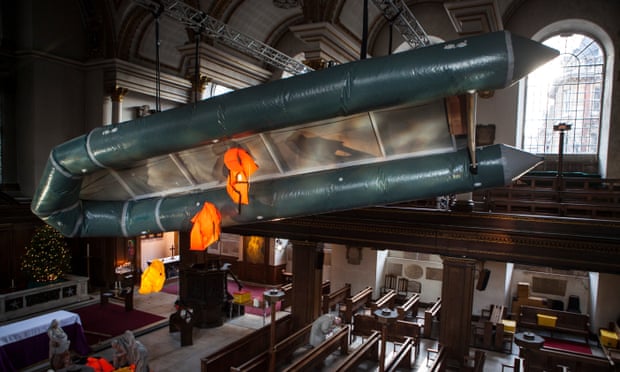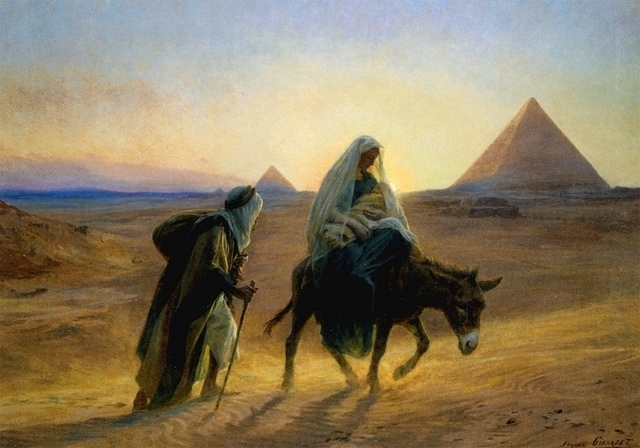Christmas morning sermon 2015

There has been one story which as dominated
the news this year, that is the refugee crisis.
Over 1 million refugees have made the perilous journey to Europe, the
vast majority coming from Syria and Iraq.
We are facing the biggest refugee crisis
since WW2. A report by the UN estimates
that there are now 60 million people who have been forcibly displaced from
their homes, and the rate of people fleeing for their lives is increasing.
For many refugees the journey to Europe took
them across the sea, a dangerous journey at the hands of people smugglers which
has resulted in the death of over 3,695
people.

'Flight' by Arabella Dorman
Hanging from the vault of St James’ Church in
Piccadilly, is an upturned refugee boat.
This dingy, designed to carry 15 people, transported 62 people from
Turkey to Lesbos in Greece. It is now an
art installation by Arabella Dorman’s entitled
Flight. The boat is suspended from the ceiling of the church, as if it were
sinking down into the depths, and falling from its safety into the void are three life jackets: two adult-sized and one a
child’s. The child’s has fallen further into the abyss, almost out of reach of the
desperate parents.
So what does this have to do
with Christmas?
You and I did not have any
choice about when, where or how we came into the world. But God did. And he left the comfort and splendour of his
heavenly home, and chose to make himself weak and vulnerable, by being born as
a human baby, totally reliant on others to feed and clothe him, to love him, care
and protect him.
He chose Mary, a young
unmarried teenager, from a small, and insignificant village in Galilee to be
the Mother of God. And he chose a stable
normally reserved for animals to be the place in which he entered the world,
and for his bed a feeding trough.
And the first witnesses to
the birth of the
Saviour of the World weren’t
priests, or prophets, or politicians or Kings, people of power
and influence but ordinary shepherds. People
who were looked down on by the rest of society, who because of their occupation
were considered unclean, and therefore weren’t even allowed to enter the Synagogue
or Temple. Shepherds who weren’t even
allowed to testify in court, because they were not trusted, and yet it was to
these people that God choose to be the first witnesses of the birth of Jesus.
When God came into the
world, it was in weakness and humility, so that he could identify and stand
alongside the weak, the poor, the outcast, the stranger, and yes the refugee.

Flight into Egypt by Eugene-Alexis Girardet
Jesus himself knew what it
was like to be a refugee. He knew what
it was like to face persecution, and to be forced from his home, like the tens
of thousands of people in Iraq and Syria who have been forced to flee their
homes to escape, persecution and death.
For Jesus the threat came from King Herod, who saw this small child as a
threat to his throne. King Herod, who
had his wife and two sons killed, because he feared they were plotting against
him. So Mary, Joseph and Jesus were driven
away from their home, to live in a foreign land.
And even when Herod died, we are told that
Joseph was afraid to take his family back to Judea, because Herod’s son
Archelaus was ruling there, and so the family returned to Nazareth in the
north.
Now
understandably, we normally ignore the dark side of the nativity narrative. We
have enough darkness of war and tragedy and refugees on our TV screens; some
come to church at Christmas to escape from all of that and be reminded that
Jesus is the light of the world. But Jesus can only be light if he shines where it is darkest.
When the
angels declared the birth of Jesus to the shepherds they said “I bring you good news that will cause
great joy for all the people.” (Luke 2:10)
It was into this dark and troubled world, that Jesus came to shine God’s
light and love.
The
Christmas story is not some fairy tale, far removed from the reality of real
life. It is a real historical event that
changed the world for ever. And it is an
event that has something important to say to a world where pain and tragedy,
suffering and loss, is still a reality for many people, because Jesus, who is
Emmanuel, God With Us, entered into the darkest places of brutal rulers and
fleeing families. He walked a path of pain greater than probably any of us have
experienced, culminating in his barbaric death at the hands of another brutal
ruler, this time, one who was too weak-willed to protect a man he knew was
innocent.
Sometimes
people picture God lounging, perhaps dozing, in some celestial deck-chair,
while millions struggle and die through war and famine and flood. But that is
not the Christian God, that is not the God we worship this day. No, that
terrible caricature of God in a celestial deck-chair is smashed to smithereens
by the crib and the cross.
What’s
your darkness at the moment? Maybe your darkness is job worries or relationship
worries or health concerns. Whatever the darkness in your life at the moment,
Jesus is God with us in the darkness.
And he
brings light in the darkness - hope in the darkness - precisely because the
darkness did not put Jesus out. Herod tried to extinguish the light of the
world at his birth, but failed. Pilate tried to extinguish the light of the
world at his death, but not even death could hold him down. So Jesus brings
light in the darkness - hope in the darkness - because he’s confronted the
darkness in our world and the darkness in our own hearts - he’s taken that evil
onto himself, and let the darkness do its worst to him - and still he shines as
the light for the world - light for you in your darkness.
Here’s
the experience of one Syrian, who was forced to flee for his life after being
threatened by ISIS fighters. Mathai walked from his home in Syria, to Damascus,
across the border to Lebanon and into Turkey, then Greece. Traffickers put him
on trains and a boat – a route where five people from his home town had
previously drowned. He trekked through Macedonia, Serbia, Croatia and Hungary.
He said, “Sometimes I was afraid, but mostly just so tired, so tired, so
exhausted.” Two months ago Mathai finally arrived in Austria. Christians gave
him a home and helped him apply for asylum. He was given an Arabic Bible. He
said, “The Bible tells me I’m not alone, it reminds me that every human is
loved by God and has a value. I’m very afraid, but when I turn to the Bible I
see light. I particularly turn to passages in the Bible that are about
forgiveness; it helps me when I think of all the people who have done awful
things in my country, Jesus experienced the same and forgave his enemies. I am
following Jesus.’’
Jesus
brings light in the very darkest places. He wants to bring light in your
darkness. And he calls us to carry his
light into the world, to follow his example and to stand in solidarity with the
poor, the hungry, the frightened, the marginalized, the disadvantaged, the
stranger, the outcast, the refugee.
As the opening verses of John’s
Gospel remind us, ‘In
the beginning was the Word, and the Word was with God, and the Word was God. He was with God in the beginning. Through him all things were made; without him nothing was
made that has been made. In him was life, and that life was the light of all mankind. The light shines in the darkness, and the darkness has not overcome it.’ (John 1:1-5)
May the light of Christ, shine in our lives, and in our
world, now and forever more. Amen.
No comments:
Post a Comment